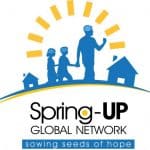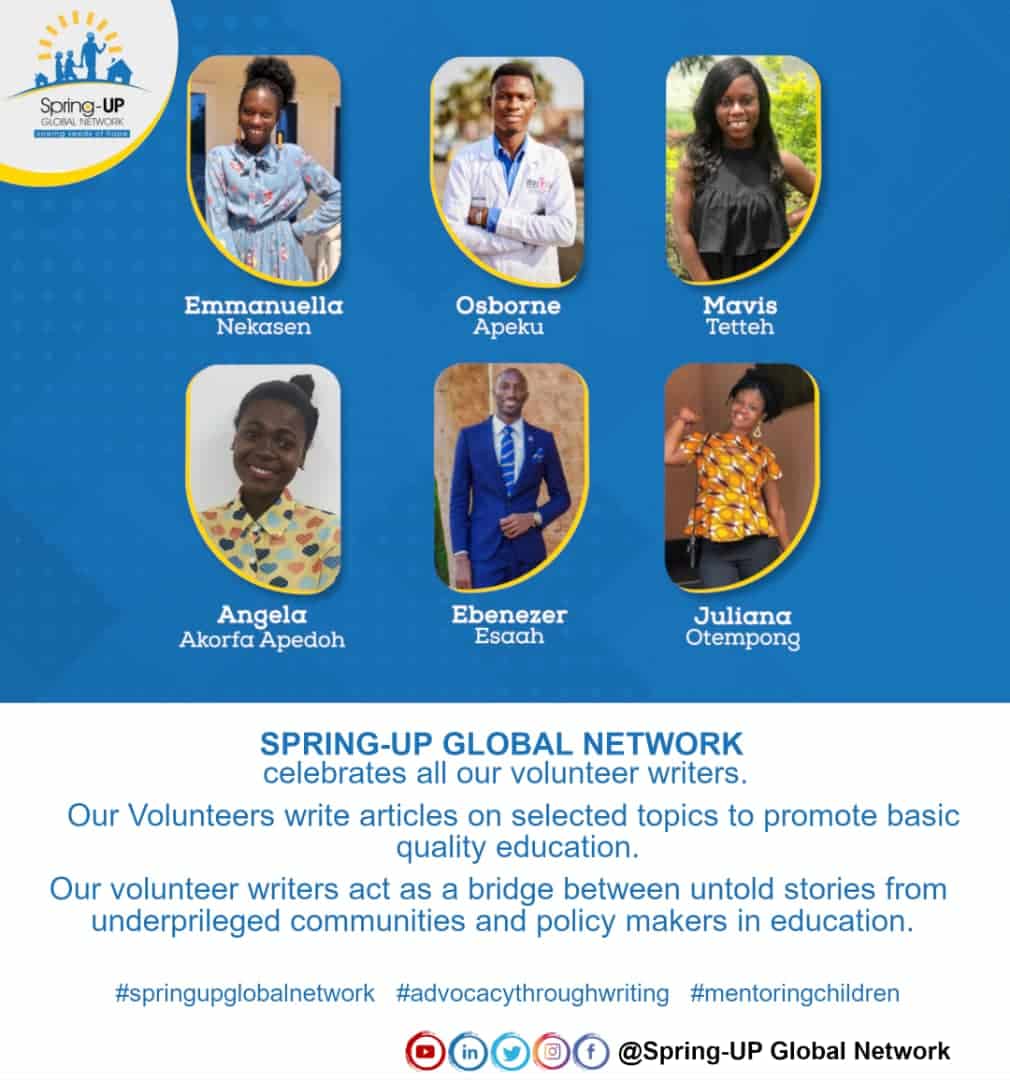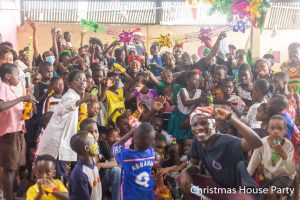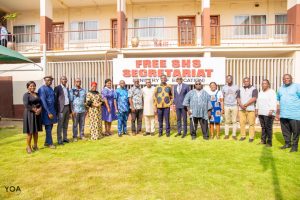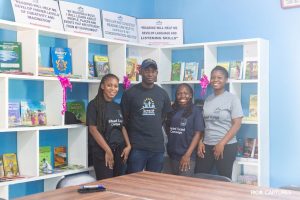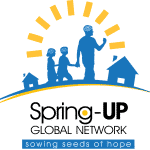We came together as a single unit that had six parts and working together over the year on the various writing projects has been nothing short of exhilarating. Six of us from different educational backgrounds and experiences yet we all agreed that the challenges of education in rural Ghana needed exposure and projection. Spring-UP Global Network was still in its early years since it was established only in 2019, and we also wanted to seize the opportunity to project the dreams and visions of the organisation through writing and become part of its success story. In this article, we share our experiences over the one year period of writing for the organisation.
Motivation
Ebenezer: “I believe strongly that we are capable of inspiring reforms and revolutions through literature. I saw writing for Spring-UP Global Network (SUGN) as an opportunity to impact society and inspire policy reforms both within the organisation and beyond. Looking back on it, writing on these issues has sharpened my ability to articulate compelling ideas which drive positive change”
Writing from firsthand experience
Osborn: “Growing up and schooling in a rural community gave me a fair idea of the challenges that pupils in rural Ghana face on a daily. However, it would seem that growing up and moving to the city brought a disconnect and these challenges did not really impress on me any feeling of association. In the later part of 2020 however, I joined the Lead for Ghana fellowship program which placed me in an underserved school in the Volta region of Ghana. This for me, brought the opportunity to experience firsthand the challenges in a typical rural basic school and so I became more enthusiastic about contributing to Spring Up Global Network through writing in order to shed light on these challenges.”
Adaptive writing
We were right in the middle of a pandemic and the challenges we all knew about had evolved. New challenges had surfaced and the pandemic had complicated the existing ones. While pupils in the urban centres were adjusting and finding ways of navigating the new challenges, pupils in rural Ghana were at a loss.
Mavis: “I envisioned writing fiction, creating characters but my experience in writing with SUGN was totally different. The issues we wrote about required facts, research, and statistics especially in a pandemic. To be able to do this, I conducted extensive research online and sometimes, I interviewed teachers and students in order to discover the challenges presented by the pandemic and how they were navigating them.”
Driving action through collaborations
Emmanuella: “The work that the organisation has taken upon itself is not one that it can do all by itself. The input of various stakeholders and other charitable organisations was made possible through our writings. Projects including the BOOK EXPEDITION and LIBRARY PROJECT kickstarted with partnerships from underprivileged schools and orphanages including media houses like YFM.”
Reflecting on impact
When we came together as a team, our main focus was how we were going to project the organisation and make an impact. We believed that while shedding light on challenges of education and the moves we were making to rewrite the story, the yardstick for measuring the impact of our writings was going to be the recognition that came as a result.
Juliet: “I believe my write-ups have highlighted the works of SUGN, whenever they are shared via our social media handles. Thus throwing more light on the objectives of SUGN as an NGO. In the end, we did not only tell stories of the struggles that these children were going through. We also told the world what we were doing in our own capacity to bridge the gap. Through this, SUGN caught the attention of many media houses and other humanitarian organisations. We got recognition from the HUMANITARIAN AWARDS GLOBAL for the tremendous contributions to CHILD EDUCATION during this period.”
Who did we write for?
Angela: “One of the questions that we repeatedly asked ourselves over the year was, “How effectively are we serving the needs of this organisation?”. This served as a golden opportunity to learn about ourselves and shape our own career paths as well but most importantly we also saw it as an honourable opportunity to support and shape the future of young people in deprived rural Ghana. So indeed, we wrote for the organisation first, the pupils experiencing education in rural Ghana and then for ourselves.”
AUTHORS:
Juliana Otempong is a graduate of the University of Ghana, Legon with a degree in Sociology and French. She currently works as an Assistant in Petits Scholars School.
Emmanuella Nekasen studied Marketing and Chinese at the University of Ghana and she is currently in her service year.
Ebenezer Esaah is a Sales Operations and Planning Manager with Milvik Ghana Limited (BIMA). He holds an MSc. in Business and Data Analytics.
Mavis Tetteh currently works as a Chinese Translator at the Kinno Industrial Company. She holds a Bachelor’s Degree in Political Science and Chinese from the University of Ghana.
Osborn Apeku is currently a Teaching Fellow of the Lead for Ghana fellowship programme. He teaches English Language in Ehi Kaledzi E.P Basic School and holds Bachelor’s Degree in Food Science and Technology from the Kwame Nkrumah University of Science and Technology. Angela Apedoh
